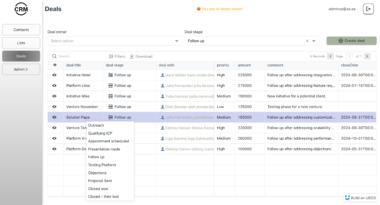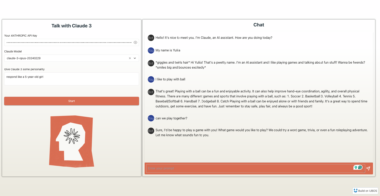UBOS Asset Marketplace: FastMCP for MCP Servers - Powering AI Agent Interactions
In the rapidly evolving landscape of AI, the ability for AI agents to seamlessly interact with external data sources and tools is paramount. This is where the Model Context Protocol (MCP) comes into play, and FastMCP provides a robust TypeScript framework for building MCP servers that facilitate this interaction.
At UBOS, we are committed to providing a full-stack AI Agent Development Platform. Our focus is on making AI Agents accessible to every business department. With our platform, you can orchestrate AI Agents, connect them with your enterprise data, build custom AI Agents with your LLM model, and create sophisticated Multi-Agent Systems. FastMCP integrates seamlessly into this ecosystem, offering a powerful tool for managing client sessions, defining tools, and integrating with Large Language Models (LLMs).
What is an MCP Server?
An MCP server acts as a crucial bridge, enabling AI models to access and interact with external data sources and tools. MCP, or Model Context Protocol, is an open protocol that standardizes how applications provide context to LLMs. This standardization is essential for creating consistent and reliable AI agent interactions.
FastMCP simplifies the creation of these servers, allowing developers to focus on defining the specific tools and resources that their AI agents need to access.
Key Features of FastMCP
FastMCP offers a comprehensive set of features designed to streamline the development and deployment of MCP servers. These features include:
- Simple Tool, Resource, and Prompt Definition: FastMCP allows you to easily define the tools, resources, and prompts that your AI agents will use. This simplifies the process of creating complex AI interactions.
- Authentication: FastMCP provides built-in authentication capabilities, ensuring that only authorized clients can access your MCP server.
- Session Management: FastMCP manages client sessions, allowing you to track and control the interactions between your AI agents and your server.
- Image Content Support: FastMCP supports the exchange of image content, enabling AI agents to process and generate visual data.
- Logging: FastMCP provides robust logging capabilities, allowing you to track the activity of your MCP server and identify potential issues.
- Error Handling: FastMCP includes comprehensive error handling, ensuring that your MCP server can gracefully handle unexpected situations.
- SSE (Server-Sent Events): FastMCP supports Server-Sent Events, allowing your server to push real-time updates to clients.
- CORS (Cross-Origin Resource Sharing): FastMCP enables CORS by default for secured data transfer
- Progress Notification: FastMCP allows you to report progress to clients, providing them with real-time feedback on long-running operations.
- Typed Server Events: FastMCP uses typed server events to handle all the server requests.
- Prompt Argument Autocompletion: FastMCP provides autocompletion of prompt arguments, making it easier for clients to construct prompts.
- Sampling Request: FastMCP makes sure to make sampling request for better processing.
- Automatic SSE Ping: FastMCP automatically pings to SSE to make sure that all requests are processed without failure.
- Route Management: FastMCP provides flexible route management.
- CLI for Testing and Debugging: FastMCP includes a command-line interface (CLI) for testing and debugging your MCP server.
Use Cases for FastMCP
FastMCP can be used in a wide variety of applications, including:
- AI-Powered Automation: Automate tasks by allowing AI agents to interact with external systems and data sources.
- Intelligent Chatbots: Create more intelligent chatbots by providing them with access to relevant context and information.
- Personal Assistants: Develop personal assistants that can perform tasks on behalf of users by interacting with external services.
- Data Analysis: Enable AI agents to analyze data from various sources and generate insights.
- Content Creation: Automate the creation of content by allowing AI agents to access and manipulate data.
Deep Dive into Key Concepts
To effectively leverage FastMCP, it’s essential to understand its core concepts:
Tools
Tools are the functions that your MCP server exposes to clients and LLMs. They define the actions that can be performed. FastMCP uses the Standard Schema specification for defining tool parameters, allowing you to use your preferred schema validation library, such as Zod, ArkType, or Valibot.
For example, you can define a tool that fetches the content of a webpage:
typescript import { FastMCP } from “fastmcp”; import { z } from “zod”;
const server = new FastMCP({ name: “My Server”, version: “1.0.0”, });
server.addTool({ name: “fetch-zod”, description: “Fetches the content of a URL (using Zod)”, parameters: z.object({ url: z.string(), }), execute: async (args) => { // Fetch webpage content logic here return await fetchWebpageContent(args.url); }, });
Resources
Resources represent the data that your MCP server provides to clients. This can include files, screenshots, log files, and more. Each resource is identified by a unique URI and can contain text or binary data.
For example, you can define a resource that provides access to an application log file:
typescript server.addResource({ uri: “file:///logs/app.log”, name: “Application Log”, mimeType: “text/plain”, async load() { return { text: await readLogFile(), }; }, });
Prompts
Prompts allow you to define reusable prompt templates and workflows that clients can easily present to users or LLMs. This provides a powerful way to standardize and share common LLM interactions.
For example, you can define a prompt that generates a Git commit message:
typescript
server.addPrompt({
name: “git-commit”,
description: “Generates a Git commit message”,
arguments: [
{
name: “changes”,
description: “Description of the Git diff or changes”,
required: true,
},
],
load: async (args) => {
return Please generate a concise and descriptive commit message for these changes:nn${args.changes};
},
});
Authentication and Sessions
FastMCP allows you to authenticate clients using custom functions. This ensures that only authorized clients can access your MCP server. The session object provides access to the active client session, allowing you to maintain state and track client interactions.
Integrating FastMCP with UBOS
FastMCP seamlessly integrates with the UBOS platform, providing a powerful tool for building AI agents that can interact with external data sources and tools. By using FastMCP in conjunction with UBOS, you can create sophisticated AI solutions that are tailored to your specific business needs.
Getting Started with FastMCP
To get started with FastMCP, you can install it using npm:
bash npm install fastmcp
Then, you can create a simple MCP server and test it using the FastMCP CLI:
bash npx fastmcp dev server.ts
You can also inspect your server using the MCP Inspector:
bash npx fastmcp inspect server.ts
Example Scenarios:
AI-Driven Content Generation:
- An AI agent needs to generate marketing content for a new product.
- The agent uses a FastMCP server to access product data (name, features, benefits) stored in a database.
- The agent uses another tool exposed via FastMCP to analyze competitor data scraped from the web.
- The agent formulates compelling marketing copy using these data points, which is then reviewed by a human editor.
Automated Customer Support:
- A customer support chatbot needs to access customer order history to answer inquiries.
- The chatbot uses a FastMCP server to query an order management system.
- The chatbot accesses customer information through a CRM system, also exposed via FastMCP.
- The chatbot then responds to the customer with accurate and relevant information.
AI-Powered Financial Analysis:
- An AI agent analyzes market trends and generates investment recommendations.
- The agent accesses real-time stock prices and financial news through a FastMCP server connected to financial APIs.
- The agent queries historical data from a financial database, again via FastMCP.
- The agent uses this information to generate personalized investment advice for clients.
Smart Home Automation:
- An AI agent controls smart home devices based on user preferences and environmental conditions.
- The agent uses a FastMCP server to interact with smart lights, thermostats, and other devices.
- The agent retrieves weather data from an external API, exposed via FastMCP.
- The agent optimizes energy consumption based on these data points.
Conclusion
FastMCP is a powerful tool for building MCP servers that enable AI agents to interact with external data sources and tools. By using FastMCP in conjunction with the UBOS platform, you can create sophisticated AI solutions that are tailored to your specific business needs. As the AI landscape continues to evolve, FastMCP will play an increasingly important role in enabling seamless and intelligent AI agent interactions.
FastMCP
Project Details
- yamato-snow/2025_McpLab_FastMCP
- fastmcp
- MIT License
- Last Updated: 4/12/2025
Recomended MCP Servers
OpenAPI specification MCP server.

MCP Server for interacting with LogSeq graph

Damn Vulnerable MCP Server

Webflow MCP server

This MCP (Model Context Protocol) server is integrated into Claude's MCP and maintained by SailFish

A Model Context Protocol (MCP) server that enables LLMs to interact directly with Couchbase databases. Query buckets, execute...


Grounded Documentation for LLMs
GitHub's official MCP Server

A Model Context Protocol (MCP) server for TfNSW's realtime alerts API

 From vibe coding to vibe deployment. UBOS MCP turns ideas into infra with one message.
From vibe coding to vibe deployment. UBOS MCP turns ideas into infra with one message.





